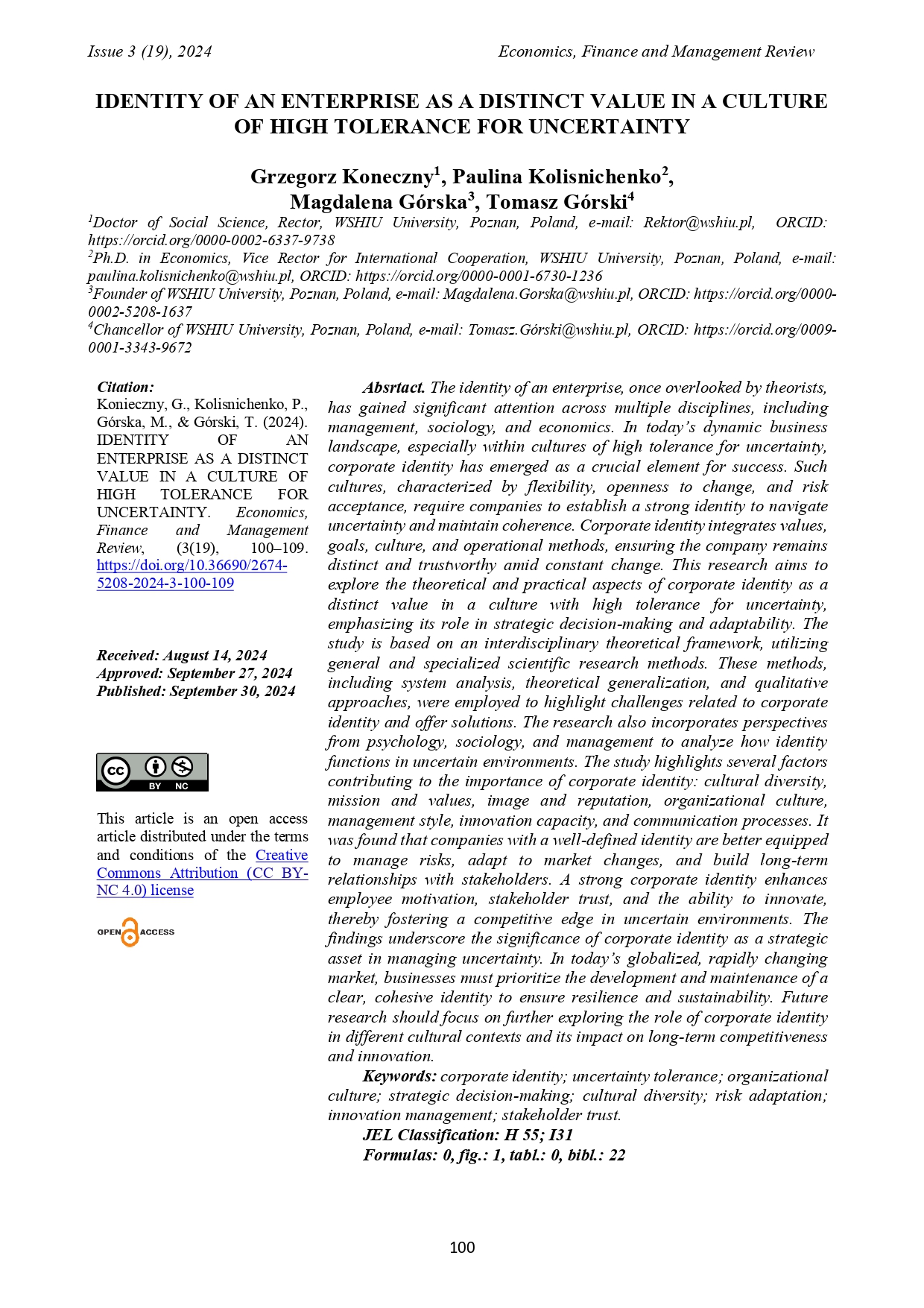IDENTITY OF AN ENTERPRISE AS A DISTINCT VALUE IN A CULTURE OF HIGH TOLERANCE FOR UNCERTAINTY
DOI:
https://doi.org/10.36690/2674-5208-2024-3-100-109Keywords:
corporate identity, uncertainty tolerance, organizational culture, strategic decision-making, cultural diversity, risk adaptation, innovation management, stakeholder trustAbstract
The identity of an enterprise, once overlooked by theorists, has gained significant attention across multiple disciplines, including management, sociology, and economics. In today’s dynamic business landscape, especially within cultures of high tolerance for uncertainty, corporate identity has emerged as a crucial element for success. Such cultures, characterized by flexibility, openness to change, and risk acceptance, require companies to establish a strong identity to navigate uncertainty and maintain coherence. Corporate identity integrates values, goals, culture, and operational methods, ensuring the company remains distinct and trustworthy amid constant change. This research aims to explore the theoretical and practical aspects of corporate identity as a distinct value in a culture with high tolerance for uncertainty, emphasizing its role in strategic decision-making and adaptability. The study is based on an interdisciplinary theoretical framework, utilizing general and specialized scientific research methods. These methods, including system analysis, theoretical generalization, and qualitative approaches, were employed to highlight challenges related to corporate identity and offer solutions. The research also incorporates perspectives from psychology, sociology, and management to analyze how identity functions in uncertain environments. The study highlights several factors contributing to the importance of corporate identity: cultural diversity, mission and values, image and reputation, organizational culture, management style, innovation capacity, and communication processes. It was found that companies with a well-defined identity are better equipped to manage risks, adapt to market changes, and build long-term relationships with stakeholders. A strong corporate identity enhances employee motivation, stakeholder trust, and the ability to innovate, thereby fostering a competitive edge in uncertain environments. The findings underscore the significance of corporate identity as a strategic asset in managing uncertainty. In today’s globalized, rapidly changing market, businesses must prioritize the development and maintenance of a clear, cohesive identity to ensure resilience and sustainability. Future research should focus on further exploring the role of corporate identity in different cultural contexts and its impact on long-term competitiveness and innovation.Downloads
References
Ashforth B.E., Mael F., Social Identification Theory and the Organisation, [w:] Organisational Identity. A Reader, red. M.J. Hatch, M. Schultz, Oxford University Press, Oxford - New York 2004
Bańka A., Otwartość na nowe formy doświadczania pracy i codzienności a procesy integracji osobowości, [w:] Gerlach R. (red.), Praca człowieka w XXI wieku, Konteksty- wyzwania- zagrożenia, Bydgoszcz 2008
Branson R., Like a Virgin. Czego nie nauczą Cię w szkole biznesu, Wyd Studio EMKA, 2014
Cannella Albert A. Jr, Entrepreneurship Theory and Practice, 2003
Connors R. J., Warren Buffett o biznesie. Wyd. MT Biznes, Warszawa 2010
Gioia D. A., Schultz M., & Corley K. G., Organizational identity, image, and adaptive instability. Academy of Management Review, 2000, 25(1)
Hatch M. J., & Schultz M., Scaling the tower of Babel: Relational differences between identity, image, and culture in organizations. Organization Science, 2000, 11(6)
Hitt M. & A. Hitt, Ireland, Hoskisson, Strategic Management, Edition, 2 ; Publisher, West Publishing Company, College & School Division, 1996
Leander K., Cook T., Człowiek, który wzniósł Apple na wyższy poziom, Wyd. Sine Qua Non, 2019
Pratt M. G., The good, the bad, and the ambivalent: Managing identification among Amway distributors. Administrative Science Quarterly, 45(3), 2000
Revisited Albert and Whetten, Strengthening the Concept of Organizational Identity, Journal of Management Inquiry 2006, 15(3)
Robbins S., Zachowania w organizacji, Poznań 1997
Róg J., Kultura organizacji, Wyd. UŚ, Gliwice 2007
Schein E. H., Organizational culture and leadership, 2004
Solarz J.K., Narodowe style zarządzania, [w:] Sajkiewicz A. (red.), Zarządzanie zmianami w zasobach pracy, Warszawa 1998
Stakeholder A. , Approach to Organizational Identity. The Academy of Management Rewiew, 2000
Stankiewicz J., Komunikowanie się w organizacji, Wrocław 2006
Steinman H., Schreyoegg G., Zarządzanie. Podstawy kierowania przedsiębiorstwem, Wrocław 1992
Sułkowski Ł., Kulturowa zmienność organizacji, Polskie Wydawnictwo Ekonomiczne, Warszawa 2002
Terelak J. F., Psychologia organizacji i zarządzania, Warszawa 2005
Terelak J. F.,, Psychologia organizacji i zarządzania, Warszawa 2005
Whetten D. A., Mackey A., A social actor conception of organizational identity and its implications for the study of organizational reputation. Business & Society, 41(4), 2002

Downloads
Published
How to Cite
Issue
Section
License

This work is licensed under a Creative Commons Attribution-NonCommercial 4.0 International License.








